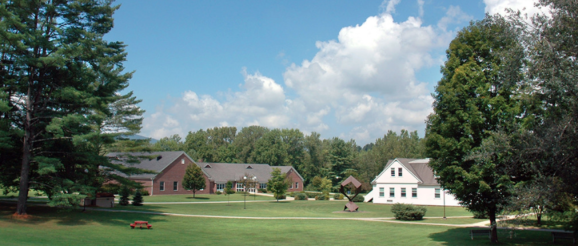College of St. Joseph envisions future as innovation hub


A southern Vermont college that shut down earlier this year believes it has found a sustainable path forward.
A 100-page study released this week by the College of St. Joseph with the help of the Vermont Innovation Commons argues that the Rutland school could reimagine itself as the CSJ Center for Excellence and Innovation.
The New England Commission of Higher Education formally pulled its accreditation this summer over concerns about the school’s finances, which means CSJ can’t receive federal financial aid for traditional degree programs. But a newly-created public-private partnership, the report argues, could invest in the campus to create an innovation hub that could offer certificate programs, workforce training, co-working spaces, and support for start-ups.
The school-turned-innovation-center could also supplement its income with event space rentals and a “gap-year” athletic program that would serve teens who want to take a year off to do sports between high school and starting college. And CSJ would also maintain its existing Traumatology Institute, a certificate program that trains students, first responders, and paraprofessionals in the mental health, law enforcement, military and education fields.
The release of CSJ’s feasibility study comes at a time of profound change in higher education. A long-simmering enrollment crisis has boiled over, and schools are shuttering across the country at a rapid pace.
Vermont has been hit particularly hard. Two schools – Southern Vermont College and Green Mountain College – have closed outright this year and put their campuses on the market. A third, Marlboro College, is in search of a partner, while a fourth, Goddard College, is on probation with NECHE.
“We have a chance to try something new that could be a national leader, an example for other schools that are struggling,” VIC program director Dennis Moynihan said.
The study recommends CSJ keep the core assets of its main campus, and in some cases substantially renovate them. But it also suggests selling off the real estate assets of CSJ’s “West Campus”, a smaller parcel with five buildings, including the college’s Clementwood House, which currently houses administrative offices, and four cottages or storage structures.
The report also envisions tapping into several federal tax incentives including the new Opportunity Zone program, which gives investors in certain low-income communities a break on capital gains taxes. The entire city of Rutland has been designated an Opportunity Zone.
Moynihan said the federal program is in “early days,” but Opportunity Zones are also “potentially really powerful.”
“It can unlock a tremendous amount of national investment,” Moynihan said.
The report is upfront about the challenges ahead. While not nearly as heavily saddled with debt as other schools that have closed – Green Mountain owed nearly $20 million to the USDA when it shut down – CSJ is basically out of cash. The study notes the campus is subject to two promissory notes and mortgages to Heritage Family Credit Union, which have been in forbearance since the school stopped offering classes in May. The college is also indebted to several vendors.
The region’s population is also relatively small and aging, and the Rutland area does not have a robust tech sector. The study acknowledges that demand will be slow to start, and estimates that it will likely be at least two years before a re-branded CSJ can operate in the black.
Jane Kolodinsky, an economics professor who focuses on community development at the University of Vermont, notes that most of what’s proposed aren’t new ideas. So-called innovation centers are popping up in cities across the country, including Burlington. And certificate programs are a booming industry.
“Every single institution of higher education and others, in our state and around the country, are thinking that certificates are going to be the next thing that people line up to pay for,” she said. “The jury is still out on that.”
But Kolodinsky thinks CSJ’s plan is a good one – mostly because it includes a healthy mix of possible revenue streams, and because it has already identified partners with which to anchor the project and fill a local workforce need. That includes the idea to design an operating room nurse training program together with the Rutland Regional Medical Center.
“I think that those partnerships that they’re starting with are really important, and will go a long way in helping them grow,” she said.
Read the story on VTDigger here: College of St. Joseph envisions future as innovation hub.
